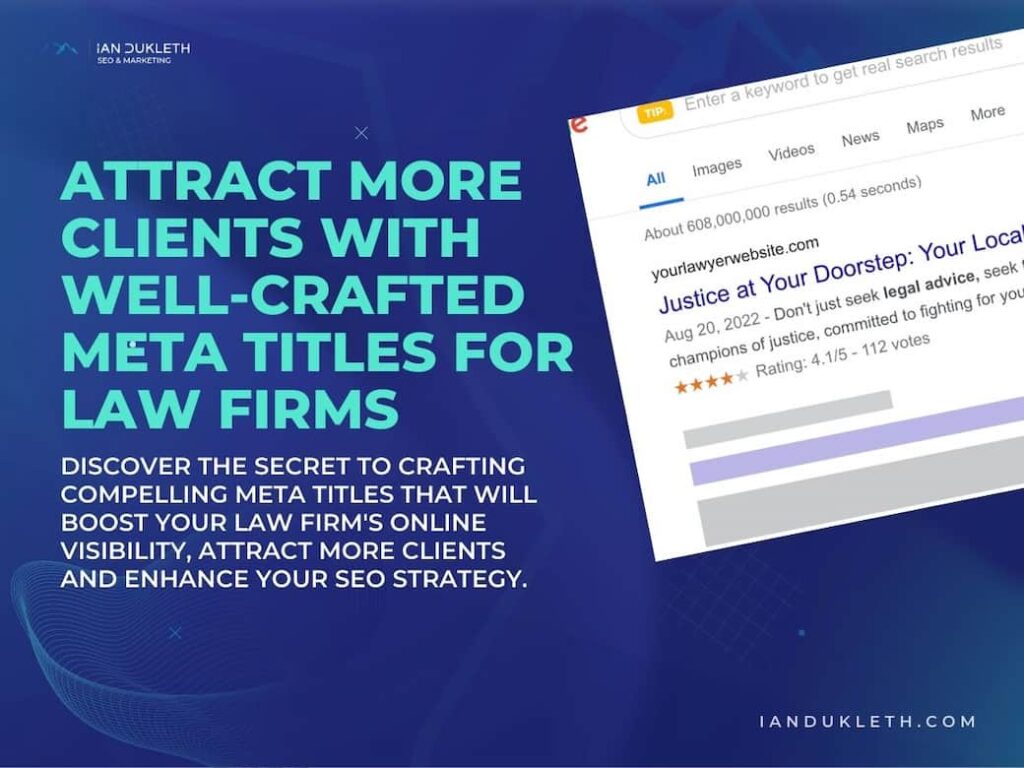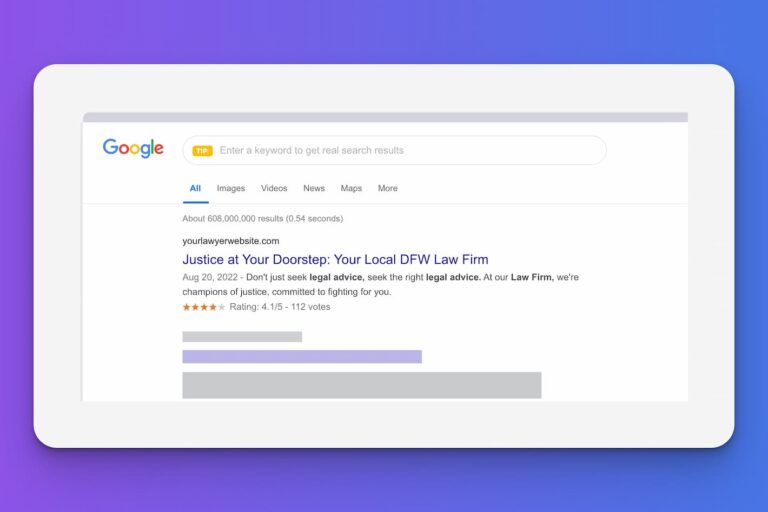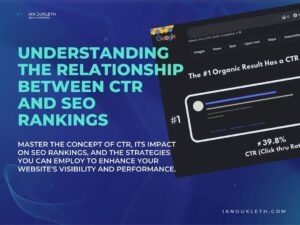Mastering the Art of Crafting Meta Titles for Law Firms
As someone involved with a law firm, you understand the power of words. You use them to argue your case, to convince and persuade. But did you know that the same principles apply when it comes to your firm’s online presence? It all begins with mastering the art of creating meta titles, a fundamental element of SEO.
By the end of this article, you will be well-equipped to improve your law firm’s meta titles and bring in more potential clients. So let’s get started!👇🏼

Key Takeaways
Mastering the art of crafting effective meta titles is crucial for law firms seeking to enhance their online visibility and attract potential clients. These titles should be relevant, clear, appropriately lengthened, keyword-optimized, and unique for each webpage.
Common mistakes such as keyword stuffing, using vague titles, or duplicating meta titles should be avoided. Lastly, understanding your audience, utilizing SEO tools, and continuously refining your meta titles based on performance are key to successful SEO for your law firm.
Understanding the Role of Meta Titles in SEO for Law Firms
Meta titles act as the headline of your webpage in the search engine results. They influence whether a user will click on your page or not. The more compelling and relevant your meta title, the higher the chances of attracting potential clients. Moreover, search engines like Google use meta titles to understand what your page is all about, which influences your search ranking.
Consider this: when people need legal help, they turn to search engines for answers. A clear, descriptive meta title can mean the difference between a potential client clicking on your law firm’s page or your competitor’s.
Key Principles in Crafting Meta Titles
While the art of crafting meta titles may seem intricate, it’s grounded on a few key principles:
- Relevance: Your meta title should accurately represent the content of the page. Misleading users can lead to high bounce rates, which negatively impacts your SEO.
- Clarity: Keep your meta title simple and easy to understand. Avoid legal jargon that could confuse potential clients.
- Length: Google typically displays the first 50-60 characters of a meta title. Aim to convey your message within this limit.
- Keyword Usage: Include relevant keywords that your potential clients are likely to use during their search.
- Uniqueness: Each page on your website should have a unique meta title.
10 Easy Steps to Creating Meta Titles for Law Firms
Creating effective meta titles doesn’t have to be daunting. Follow these steps:
1. Identify The Main Idea Of Your Webpage
Before you start crafting your meta title, it is fundamental to understand the content of the page. Identify its core message and who it is intended for. This will help you generate a title that reflects the page’s content accurately and engagingly.
2. Research Relevant Keywords
Use tools like Google Keyword Planner or Ahrefs to discover what terms your potential clients are using when looking for legal services. Identify a primary keyword for each page, along with a few secondary, supporting keywords (if relevant).
3. Start Your Meta Title With The Primary Keyword, If Possible
Including the primary keyword at the beginning of your meta title can boost its visibility in search engine results. However, it is important to ensure the title still reads naturally and makes sense to your audience.
4. Incorporate Compelling and Engaging Language
Remember, your meta title needs to entice users to click on your webpage. Using action words or verbs can inspire potential clients to take action. For example, instead of a generic meta title like:
“Family Law Services,” try “Expert Family Law Services to Resolve Family Disputes.”
5. Highlight Your Unique Selling Proposition (USP)
Differentiate your law firm from others by highlighting what sets you apart in your meta title. This could be your years of experience, specialty areas, successful case results, service guarantees, etc.
For example, “30+ Years of Criminal Defense Expertise – Free Consultation.”
6. Make Sure The Title Aligns With The Content Of Your Page 🎯
Always ensure that your meta title accurately reflects the content of your webpage. Misleading titles can frustrate users and lead to high bounce rates, which could harm your SEO performance.
7. Keep It Within The Recommended Length 📏
Search engines typically display the first 50-60 characters of a meta title. Any characters beyond that may get cut off, so ensure your meta title is brief while descriptive.
8. Ensure It’s Unique Within Your Website
Every page on your website should have a unique meta title. This helps search engines understand the individual content of each page and prevents them from getting confused between different pages.
9. Use Your Brand Name Where Appropriate
Including your law firm’s name in the meta title can enhance brand recognition, especially for your homepage or about page. However, it is not necessary for every page, particularly if it makes the title too long or detracts from the primary keyword.
10. Review And Refine
After you have created your meta title, take a step back and review it.
Ask yourself..
- Does it accurately describe the page?
- Does it include your primary keyword?
- Is it engaging and compelling?
Don’t be afraid to make tweaks and improvements.
Remember, crafting effective meta titles is both a science and an art. It requires a clear understanding of SEO principles, creativity, and a deep understanding of your target audience. It might seem challenging at first, but with practice, you will become proficient at writing meta titles that help boost your law firm’s online visibility and attract potential clients.
Common Mistakes to Avoid When Writing Meta Titles
As you begin crafting meta titles, avoid these common mistakes:
Stuffing keywords: It may seem tempting to jam all your keywords into the meta title, but this can make it unreadable and off-putting to potential clients.
Using vague or generic titles: Be specific and direct about the content of your page.
Creating duplicate meta titles: Each page of your website is unique, and its meta title should reflect that.
Utilizing Keywords in Meta Titles for Law Firms
Keywords are crucial in creating effective meta titles. Start by identifying the terms and phrases your potential clients might use when looking for your services. Tools like Google Keyword Planner or Ahrefs can provide valuable insights, as well as our done for you keyword research – with super quick turnarounds and keywords grouped by topics and buyer intent.
Tools and Resources for Crafting Meta Titles
Several tools can assist you in crafting effective meta titles:
Google Keyword Planner: Helps you discover important keywords.
Mangools: Lets you see how your meta title would look in search results. Below is an example of search engine results page preview you can use to get a better understanding of what your meta data will look like on search results.

By understanding and applying the principles and strategies outlined here, you are on your way to mastering the art of crafting meta titles for your law firm.
Not only will this enhance your online visibility, but it will also set you on the path to attracting more potential clients.
Start optimizing your meta titles today, or reach out to our team for personalized SEO services tailored for law firms. The power to elevate your firm’s online presence is in your hands. Harness it! 💪🏼
Table of Contents
Meta Titles FAQs
Meta titles inform search engines about the main topic of a web page, and they are used for ranking purposes and as the clickable element within search snippets.
They influence ranking position in search engine results pages and the number of clicks you will receive from organic search.
Studies have identified a solid correlation between keyword usage in meta titles and high rankings in search engines. Google, for example, uses the meta title to understand the context of the page, and it is also important for users as it is often the primary piece of information used to decide which result to click on.
A good meta title should aim for a length of 35 to 55 characters. Anything beyond this might get cut off in search engine results, leading to incomplete information or reducing the strength of your meta information!
In addition to weaving keywords into compelling, readable sentences, it’s recommended to include target keywords but avoid keyword stuffing. Place your primary keyword toward the front of your title tag if possible. Ensure your title tag matches search intent and minimize stop words like a, and, but, so, or, etc.
Yes, common mistakes include not creating a unique title tag for each web page, and not using your title tag to describe the page’s content to users and search bots. These practices can negatively impact your SEO and user experience.
While the initial answer is correct, it’s worth noting that a study showed an 88% increase in keywords ranking in the top seven positions across all three major search engines after making changes to meta titles. This indicates that well-constructed titles can significantly improve a site’s rankings for a specific keyword.
Meta titles should be updated whenever necessary, such as when your page content changes, or if your current meta title isn’t performing well. However, if your meta title is effective and accurately represents your page, frequent changes are not necessary.



